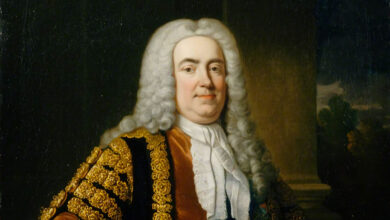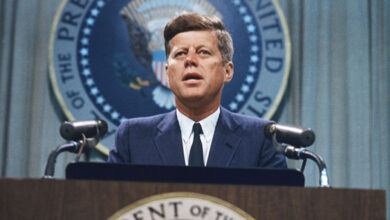Podcast: Play in new window | Download
Subscribe: Spotify | Amazon Music | Youtube Music | RSS
Oliver Reed was a force of nature on screen, a British actor whose booming voice, imposing stature, and talent for portraying complex characters made him a legend. His career, spanning four decades, was as multifaceted as the man himself. He could be a villain you loved to hate, a charming rogue, or a figure of quiet strength. Off-screen, his reputation as a notorious hellraiser fuelled by a fondness for drink and brawls only added to his mystique.
Born Robert Oliver Reed in Wimbledon, England, on February 13th 1938, his theatrical lineage was undeniable. His father, Peter Reed, was a well-respected character actor, and his uncle was the legendary director Carol Reed. Despite this background, Oliver wasn’t a natural student, and after expulsion from several schools, he opted for a dramatic academy. His film debut came in 1958, but it was his association with Hammer Films in the early 1960s that brought him to wider attention. Hammer, known for their gothic horror films, cast Reed in movies like The Curse of the Werewolf (1960) and Sword of Sherwood Forest (also 1960). While these weren’t artistic masterpieces, they showcased Reed’s screen presence and physicality.
By the mid-60s, Reed was looking to break free from genre limitations. He landed a significant role in the gritty British crime drama The Trap (1966). Then, he achieved critical acclaim for portraying the brutal Bill Sikes in his uncle Carol Reed’s musical adaptation of Oliver! (1968). The film won Best Picture at the Academy Awards, and Reed’s performance was hailed for its raw intensity. This period also saw him collaborate with director Ken Russell on daring films like Women in Love (1969) and The Devils (1971), which explored themes of sexuality and religious hypocrisy, often pushing the boundaries of censorship.
The 1970s saw Reed continue to take on diverse roles. He embodied the stoic Athos in Richard Lester’s swashbuckling adventure films The Three Musketeers (1973) and The Four Musketeers: Milady’s Revenge (1974). He appeared in cult classics like David Cronenberg’s psychological horror The Brood (1979) and Terry Gilliam’s surreal fantasy The Adventures of Baron Munchausen (1988). He also displayed a surprising comedic touch in films like Tommy (1975) and Doctor Heckyl and Mr Hype (1980).
Reed’s off-screen antics became as legendary as his on-screen performances. His reputation as a heavy drinker and brawler often overshadowed his acting talent. A notorious incident during the filming of The Three Musketeers involved him being stabbed in the throat during a stunt gone wrong, nearly ending his career. His well-publicized bar fights and arrests only added to his hellraiser image. However, those who knew him spoke of a man with a surprising intellect and a deep love for Shakespeare.
Oliver Reed was married twice. His first marriage to actress Kate Byrne in 1959 produced a son, Mark, although the marriage ended in divorce in 1969. He also had a daughter, Sarah, with dancer Jacquie Daryl, whom he met whilst filming Oliver!, though they never married. In 1985, he married Josephine Burge, with whom he remained until his death.
Oliver Reed’s final film, Gladiator, was a poignant bookend to a remarkable career. He was cast as Proximo, a decadent gladiator trainer, a role that seemed tailor-made for his larger-than-life persona. Tragically, on May 2nd, 1999, while on location in Malta, Reed died of a heart attack after a night of heavy drinking at a pub. He was 61 years old. The news sent shockwaves through the film industry. The cast and crew of Gladiator were understandably devastated. Director Ridley Scott, determined to honour Reed’s performance, made the difficult decision to complete his scenes using CGI technology and body doubles. The finished film, released in 2000, became a critical and commercial success, a fitting tribute to a complex and unforgettable actor. Though incomplete, Reed’s final on-screen performance served as a powerful reminder of his talent and charisma. Gladiator also went on to win five Academy Awards, including Best Picture. In a touching tribute, Reed was posthumously nominated for Best Supporting Actor, a testament to his impact on the film.
Oliver Reed’s legacy is multifaceted. He was a talented and versatile actor with a commanding presence on screen. He wasn’t afraid to take risks in terms of the roles he chose and in his personal life. While his hellraiser image may have overshadowed his acting at times, there’s no denying the power and charisma he brought to his performances. Whether it’s the menacing Bill Sikes or the stoic Athos, Reed’s characters remain etched in the minds of film fans. He was a true colossus of British cinema and a man who lived life on and off-screen to the fullest.
Podcast: Play in new window | Download
Subscribe: Spotify | Amazon Music | Youtube Music | RSS




